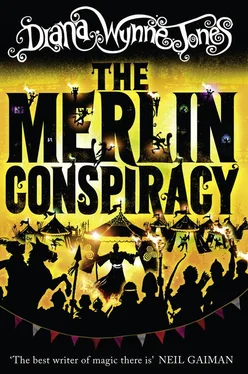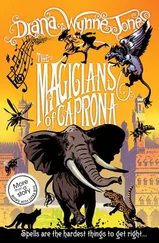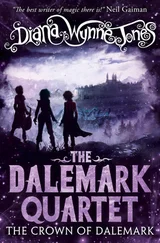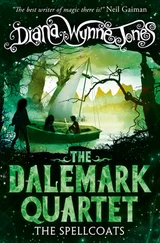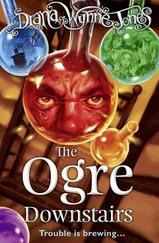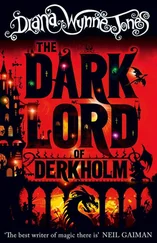He stood beside the table with his head bent. It always looked as if he was nerving himself up for something. Actually, he was just working the preliminary magics, but when I was small I always thought that weather-working took great courage and I used to worry about him. But I’ve never lost the queer amazement you feel when the magic answers Dad’s call. Even that day, I gasped quietly as mistiness filled the framework. It was blue, green and white at first, but almost at once it became a perfect small picture of the Islands of Blest. There was England in all its various greens, except for the small brown stains of towns, with its backbone of the Pennines and its southern hills as a sort of hipbone. All the rivers were there as tiny blue-grey threads, and dark green clumps of woodlands – very important each of these, Dad tells me, because you bring the picture into being by thinking of water, wood and hill – but it still defeats me why I could even see the white cliffs in the south. And Scotland was there, too, browner, with travelling ridges of grey and white cloud crossing the brown. The fierce greyness at the top was a bad storm somewhere near John O’Groats. Wales lurked over to one side, showing only as dim greens under blue-grey clouds. But Ireland was entirely clear, living up to the name of Emerald Isle, and covered in big moving ripples of sunlight.
Dad walked round it all, bending over to look at the colours of the seas particularly. Then he stood back to see the patterns of the slanting, scudding clouds. “Hm,” he said. He pointed to the north-east of England, where the land was almost invisible under smoky, whitish mist. “Here’s the rain that’s presently being such a pest. As you see, it’s not moving much. The King wants it cleared up and, if possible, a blaze of sunlight when the Scottish King arrives. Now, look at Scotland. There’s very little clear sky there. They’re having sun and showers every ten minutes or so as those clouds ripple. I can’t get any good weather from there, not to make it last. Quite a problem.”
He walked slowly in among the green landscapes and the moving clouds, passing through the wires of the framework underneath as if they were not there. That part always gave me a shudder. How could a person walk through solid gold wire?
He stopped with his hand over dim, green Wales. “This is the real problem. I’m going to have to fetch the weather from Ireland without letting this lot drift in across us. That’s really appalling weather there in Wales at the moment. I shall have to try to get it to move away north and out to sea. Let’s see how the bigger currents are going.”
Up to his waist in moving, misty map, he gestured. The whole picture humped up a little and moved away sideways, first to show a curve of heaving grey ocean, ribbed like a tabby cat with strips of whitish cloud, and then, giddily, going the other way to show green-brown views of the Low Countries and the French kingdoms and more stripes of cloud there.
“Hm,” my father said again. “Not as bad as I feared. Everything is setting northwards, but only very slowly. I shall have to speed things up.”
He set to work, rather as a baker might roll dough along a board, pushing and kneading at clumps of cloud, steering ocean wisps with the flat of his hands, and shoving mightily at the weathers over Ireland and Wales. The dimness over Wales broke apart a little to show more green, but it didn’t move away. My father surveyed it with one hand to his chin.
“Sorry, everyone,” he said. “The only way with this is a well placed wind.”
We watched him moving around, sometimes up to his shoulders in land and cloud, creating winds. Most of them he made by blowing more or less softly, or even just opening his mouth and breathing, and they were never quite where you thought they ought to be. “It’s a little like sailing a boat,” he explained, seeing Grundo frowning. “The wind has to come sideways on to the canvas to make a boat move, and it’s the same here, except that weather always comes in swirls, so I have to be careful to set up a lighter breeze going the opposite way. There.” He set everything moving with a sharp breath that was almost a whistle and stood back out of the table to time it.
After a few minutes of looking from his big, complicated watch to the movements on the table, he walked away and picked up his robe. Weather-working is harder than it looks. Dad’s face was streaming with sweat and he was panting slightly as he fetched his portable far-speaker out of a pocket in the robe. He thought a moment, to remember that day’s codes, and punched in the one for the Waymaster Royal’s office.
“Daniel Hyde here,” he told the official who answered. “The rain will stop at twelve-oh-two, but I can’t promise any sunlight until one o’clock… Yes… Almost exactly, but it couldn’t be done without a wind, I’m afraid. Warn His Majesty that there may be half a gale blowing between eleven-thirty and midday. It’ll drop to a light wind around half past… Yes, we should have fine weather for some days after this.”
He put the speaker away and smiled at us while he put on his robe. “Fancy a visit to the Petty Viands bus?” he asked. “I could do with a cup of something hot and maybe a sticky cake or two.”
It was just as Dad predicted. We turned out for the Meeting of Kings in wet, howling wind that flapped velvet skirts and wrapped robes around legs. Those with headdresses held them in their hands until the last possible moment and then got very uncomfortable because, like the rest of us, they were trying to eat prettybread or pasties in one hand as we all went to our places. Sybil looked more dishevelled than anyone. Her yellow hair was streaming from her head and her hat was streaming green ribbons in her hand while she rushed about wailing cantrips and shouting at bad-luck carriers to get away behind the buses. She was barefoot, being an earth wizard, and she had kilted her velvet skirts up to her knees because of the wet in the grass. She had extremely thick legs.
“Looks just like a sack of sweetcorn balanced on two logs,” Dad said unkindly as he passed me on the way to the King’s tent. He disliked Sybil as much as I did. He used to say that it didn’t surprise him that Sybil’s husband had run away. And then he usually added, “They wanted the poor fellow to be the next Merlin, too. If it had been me, I’d have run away long before. Sybil and the worst job in the kingdom! Imagine!”
Unfortunately, Dad’s remark threw Mam into one of her rare fits of laughter and she breathed in a crumb of pastry. I was still thumping her back for her when word came round that the Scots were on their way. I had to run to my place beside Grundo. We were lined up with all the other children who weren’t pages in a row in front of the Royal Guards.
By this time, most of the tents were down except for the Royal Pavilion, and all the buses, vans, lorries and limousines were drawn up on three sides of an enormous square with the north-facing side left empty. The air was loud with the clapping of the household flags hoisted over them. The Royal Guards were drawn up inside that – poor fellows, they had been polishing kit and whitening belts since dawn, but they looked magnificent, a living line of scarlet and white. We of the Court were inside that again, like a bed of flowers in our Court clothes, shivering in the wind. Grundo said he envied the Household servants. They were allowed to stay in the buses and keep warm, and they had a much better view. They must have been able to see the Scottish Court advancing long before we could.
It was all timed perfectly. Hard-worked officials had been talking to one another on far-speakers all morning to make sure it was. The Scots appeared first. They seemed to come over the horizon and get larger and brighter as they came. They had pipers walking on both sides, solemnly stepping and skirling. I love the sound of bagpipes. It is the most exciting noise I know. I was quite sorry when our band started up and trumpets drowned the pipes out.
Читать дальше
